|
Tomorrow, we celebrate the birthday of St. Vincent Pallotti, patron of the Catholic Apostolate Center and founder of the Union of Catholic Apostolate. St. Vincent Pallotti was born on April 21, 1795. How appropriate for the saint who lived and worked in the city of Rome to share his birthday with the traditional date for the founding of the city. To help celebrate his birthday, I have put together a list of some of his more interesting achievements and activities during his life. I hope that you too will be inspired by his life. 1) The Baptism of St. Vincent Pallotti St. Vincent Pallotti was baptized on April 22, 1795 in the St. Lawrence Church in Rome. This began his life in the church. 2) St. Vincent Pallotti on Holiday On his arrival in Frascati around 1805, St. Vincent Pallotti exchanged his new shoes for that of a poor boy. Giving away his new clothing to the poor would become a lifelong habit for the saint. 3) St. Vincent Pallotti Makes a Prediction While speaking with the young Giovanni Mastai-Ferretti in 1817, St. Vincent Pallotti predicted that he would one day be elected to the papacy. Mastai-Ferretti was elected Bishop of Rome on June 16, 1846. 4) St. Vincent Pallotti the Professor St. Vincent Pallotti was awarded two doctoral degrees in both theology and philosophy in 1814 and 1819. Teaching was one of the favorite activities of the saint. 5) St. Vincent Pallotti Showing Courage During the cholera epidemic of 1837, St. Vincent Pallotti organized a barefoot procession of religious. This action was penitential and showed that they were not afraid of the disease. 6) Catholic Apostolate Received Church Approval St. Vincent Pallotti received approval for the Catholic Apostolate from the Church in 1835. Pallotti also received support for the Catholic Apostolate from Pope Gregory XVI when others objected to it. 7) St. Vincent Pallotti the Chaplain Beginning in 1838, St. Vincent Pallotti served as a prison chaplain in Rome. He often worked with the condemned, saving many souls. He had a true willingness to serve all, especially the poor and the marginalized. 8) St. Vincent Pallotti the Peacekeeper St. Vincent Pallotti stopped a riot in the Trastevere neighborhood of Rome. He implored the people to stop rioting by showing them an image of Mary, Mother of Divine Love. 9) St. Vincent Pallotti Preaches one Last Time On the last day of the octave of the Epiphany in 1850, St. Vincent Pallotti gave his final sermon. 10) St. Vincent Pallotti Dies In 1850, St. Vincent Pallotti gave his final blessing to his followers. He showed great courage even in the face of death. There are many more stories about St. Vincent Pallotti that you may find interesting. Check out our St. Vincent Pallotti Portal to learn more about our patron and his many works.
0 Comments
Today we celebrate the 83rd birthday of our Holy Father, Pope Francis. We thank God for the gift of his life and pray for his continued health and leadership in our Church.
Having a birthday near the holidays must be pretty hard to bear as a child, and maybe even sometimes as an adult. Birthdays are meant to be celebrated, and sometimes they can be overshadowed by other holiday celebrations! My sister has a birthday on Christmas Day and she never seemed to be able to celebrate the same ways I could (my birthday is over the summer). I always felt bad and try to still make it special for her - even now that we are adults. Although we know Pope Francis for his humility and selflessness, I’m sure even he has found it hard to celebrate his special day from time to time. We celebrate birthdays as a way to mark our growing one year older, but I’m sure with a birthday so close to Christmas, his focus has often been on Christ. I would imagine, in his ministry, our pope has reflected on the significance of their birthdays being so close and how he can look to the purpose of the season over his own celebrating. Let’s also reflect on this now. How can we make Jesus’ birthday especially meaningful this year? In what ways can we strive to “celebrate” with Christ? What implications does Christmas have on my upcoming year as I continue to grow in my faith? “The reason for the season” is a common phrase we hear at this time of the year— a helpful little rhyme to keep us thinking about Jesus’ birth. The purpose of the Son of God coming to Earth was to save us all from our own sins, yet we so often confuse this time with shopping deals and stressful holiday travel plans. Our Lord doesn’t need any of that. He doesn’t need physical gifts—he needs our hearts. He doesn’t need perfection—he yearns for our humble, raw, and disheveled selves. He doesn’t need displays of lights and blow-up snowmen—he needs us to shine his light in the darkness. In order to celebrate his birth, we must first put aside the distractions and concerns that keep us away from prayer and peace at Christmas. The meaningful celebrating that we should be doing for Christ isn’t wrapped up with bows and shiny paper, but includes finding time to appreciate and pray about our Lord’s coming. The celebration for an ordinary person may be tied to cake, candles, and presents, but as Pope Francis would likely agree, celebrating Christ comes from the heart. One way I’ve found to celebrate Christ’s birthday amidst the hustle and bustle of the season is by listening to joyful, instrumental Advent and Christmas music. Something about it makes me feel so peaceful and filled with the joy of Christ that I almost prefer it to lyrical Christmas music on the radio or Spotify! Another practice I’ve found to be helpful is focusing on the giving aspect of Christmas. I feel better giving rather than getting things. My favorite way to celebrate the birth of Jesus is to share the gift of the Christmas story with my young Pre-Kindergarten students. Having been blessed to work in a Catholic school, I’m able to share the incredible birth story of Jesus Christ and to teach those beautiful little minds about God’s promise of love to the world. When I sit back and realize the gravity of my role as a catechist to these children, I feel humbled by it. My heart soars, it prepares my soul for Christmas, and I’m reminded of this holy birthday from so long ago in Bethlehem. As we look toward a new year, both for Pope Francis and for us Catholics, we are reminded that Christmas is only the beginning of Christ’s work on Earth. His ministry will begin at a wedding as an adult farther down the line, and his death and Resurrection happen even later than that. We know Christ’s birthday was celebrated by angels sharing the Good News. We know there were shepherds who also heard about Jesus’ birth, and finally three wise men who followed the star to where Jesus was born. This new year has so much faith-filled potential to allow us a chance to listen closely to how the Gospel message tells us to love and to share our love with those we meet. We can show God’s love to all by living out each day as apostles who share the Good News. So today, on this 83rd birthday of our pope, keep him in your prayers. Pray for continued faithful leadership in our Church at this tumultuous time in our world. Pray for his health, that he may find strength in Christ and remain well. Feliz cumpleaños, Papa Francisco! For more resources to accompany you this Advent and Christmas, please click here. This year seems like a year of baby announcements for me! Just as I have prepared for the parade of invitations and happy save-the-dates for graduations and weddings, I’ve been preparing in my own way for the arrivals of friends’, parishioners’, and family’s little ones. With the arrival of spring, so too comes the arrival of brand new family members. At Mass recently, the choir began singing “What a Beautiful Name” during the Eucharistic procession. I couldn’t help but picture the new names and faces that would fill stories from now on. With each birth announcement came the first, middle, and last name along with weight, length, and time of birth. These surely were moments that changed so many lives forever! I could hear the parents and families singing this song for the new baby boy or girl. As I pictured the new names and faces, I prayed using the name that changed humanity–Jesus. Each verse of “What a Beautiful Name” builds upon the last. Jesus’ name is beautiful, wonderful, powerful. The melody and harmony invite you into a transformative reality. Jesus–who is the King, Savior, Son of God, Prince of Peace–knows your name and is present to you in the Eucharist (CCC 432). You didn't want heaven without us So Jesus, You brought heaven down Throughout the Old and New Testaments, we learn about the significance of names and the process of naming. Some names change as different Biblical figures embrace a new mission or vocation: like Abram, Jacob, and Simon. Listening to this song led me to reflect on those figures in Scripture and on Jesus’ Paschal Mystery in light of the birth announcements. His is the only name through which humanity is saved—the name “above every name.” I hope to witness the love of Christ in these babies and in their unique names that are so meaningful. These names are written on the palms of His hand and show God’s unconditional love for His people and the love for His Son, Jesus. Yours is the Kingdom, Yours is the glory Yours is the Name, above all names This spring and Easter Season calls me to slow down and pray with the name of Jesus. I pray in thanksgiving for new life and new names. I pray for the hearts of these little ones and hope that they come to know and witness the beauty, wonder, and power in Jesus’ name. Question for Reflection: Try praying the simple prayer of Jesus’ name. Think of the history and significance of names in your life, the lives of family members, the saints, and scripture. How have each of these names influenced your faith? During college, I had a professor with a reputation for being extremely challenging. Upperclassman students would warn us as freshman: “whatever you do, don’t take him! You will work more in his class than you ever have before!” I vividly recall one chilly, December afternoon walking by this professor’s office and watching students storm out from it, visibly angry. “Not good,” I thought to myself. It would certainly be easier to continue to breeze by in my classes than to be challenged. My senior year, against all advice, I decided to enroll in this professor’s class. The warnings from the upperclassmen were correct. He was difficult and challenged me to grow in my craft like no educator before had ever challenged me. And for that, I am forever thankful. How can you grow without being challenged? I am only the professional I am today because my professor was dissatisfied with the status-quo. He knew his curriculum would be difficult, but he believed that each of his students could achieve more, even though it was uncomfortable and challenging. He wanted us to excel rather than simply get by. As I reflect on Pope Francis’ upcoming 81st birthday and give thanks to God for his ministry, I see some similarities between him and my professor. One of our Holy Father’s greatest gifts to the people of God is that he challenges us to be uncomfortable with the status-quo, with “maintenance mode.” In Evangelii Gaudium, Pope Francis exclaims: “In our day Jesus’ command to ‘go and make disciples’ echoes in the changing scenarios and ever new challenges to the Church’s mission of evangelization, and all of us are called to take part in this new missionary ‘going forth’. Each Christian and every community must discern the path that the Lord points out, but all of us are asked to obey his call to go forth from our own comfort zone in order to reach all the ‘peripheries’ in need of the light of the Gospel.” Pope Francis, much like my professor in college, presents us with a challenge because he knows that the Church’s potential is incredible, even if this shift to mission mode is not easy. Convincing our colleagues and community to move from maintenance mode to mission mode, however, can be difficult. Some parish leaders I have encountered argue that their parish has always done something in a certain way and that if they changed it half of their parishioners would leave the parish. Nevertheless, in Evangelii Gaudium, Pope Francis reminds us that: “Pastoral ministry in a missionary key seeks to abandon the complacent attitude that says: ‘We have always done it this way’” (EG, no. 33). The only way that parishes will become missionary communities that are focused on going forth to form missionary disciples is by shedding their contentedness with the status-quo and aversion to conflict at all costs. Pope Francis continues, “the word of God constantly shows us how God challenges those who believe in him ‘to go forth.’” Let us then turn to God and his Word in order to have the courage to go forth! Moving from maintenance to mission will be uncomfortable, but, as Pope Francis prophetically reminds us, is our calling as followers of Jesus Christ. Please join me and the Catholic Apostolate Center team in wishing Pope Francis a very happy and blessed 81st birthday, which he will celebrate on December 17th! For more resources on Missionary Discipleship, please click here. Each year, I look forward to attending Midnight Mass on Christmas. It is one of those Catholic "hallmarks" that helps us to ring in the celebration of Christmas. This year was no different, and I was able to assist at my Cathedral's celebration of Midnight Mass. As we continue on in the great octave of Christmas, I would like to look back on the readings and texts from the "Mass During the Night," more commonly known as Midnight Mass. “O God, [you] have made this most sacred night radiant with the splendor of the true light…” (Collect, Christmas Mass During the Night). Sometimes I scratch my head trying to make sense of the Collect prayer, the “opening prayer,” used during the Mass. The Collect prayer that we prayed during Midnight Mass, though, is quite fitting for this particular celebration of the Eucharist, as the Church throughout the world gathered together in the quiet stillness of the night to celebrate the birth of Jesus Christ, the “infant [found] wrapped in swaddling clothes and lying in a manger” (Lk 2:12). This “most sacred night” is indeed “radiant with the splendor of the true light," the light of Christ, the light that brightens not only the darkness of the night sky but also the darkness of our world, the darkness that often creeps its way into our own lives and our own hearts. “The people who walked in darkness have seen a great light” (Is 9:1)! When we find ourselves in a dark room, or when the sun begins to set at the end of the day, what do we do? We turn on a lamp; we turn on the lights. When we find ourselves in internal times of darkness, what do we do? We should turn to Jesus Christ, who, as we hear so beautifully articulated in the Proclamation of the Birth of Christ, is the “eternal God and Son of the eternal Father, desiring to consecrate the world by his most loving presence…” “The people who walked in darkness have seen a great light” (Is 9:1)! The words that the prophet Isaiah addressed to us in the first reading from this Mass are so filled with meaning for us, especially as we fumble and flounder in the darkness of our world and in our own lives. For upon us all, “a light has shone” (Is 9:1). We often walk in darkness: the darkness of our own worries and anxieties, the darkness of our own sins and shortcomings, the darkness of loneliness and isolation. Whatever burdens us, Isaiah invites us to be brought from darkness into God’s most marvelous light, which is found in the person of Jesus Christ. Isaiah tells us that “upon those who dwelt in the land of gloom a light has shone” (Is 9:1). The light that shone in the time of Isaiah is the same light that shone on the “shepherds in that region living in the fields and keeping the night watch over their flock” (Lk 2:8). As the shepherds were keeping watch, “the angel of the Lord appeared to them” (Lk 2:9). On that holy night in Bethlehem, only the humble shepherds were aware of the Word becoming flesh—of Jesus being born of the Virgin Mary. Today, the whole world knows of the Light of the World, Emmanuel—“God-is-with-us,” “Wonder-Counselor, God-Hero, Father-Forever, Prince of Peace” (Is 9:5)…our “savior Jesus Christ, who gave himself for us to deliver us from all lawlessness” (Ti 2:14), to deliver us and grant us peace and consolation from all that causes chaos or disorder or stress in our lives. “The people who walked in darkness have seen a great light” (Is 9:1)! Our Holy Father, Pope Francis, reflecting on these beautiful words, talks about light—the permeating theme of the great solemnity that we celebrate at Christmas. Our Holy Father says, “The people who walked–caught up in their activities and routines, amid their successes and failures, their worries and expectations–have seen a great light. The people who walked–with all their joys and hopes, their disappointments and regrets–have seen a great light. In every age, the People of God are called to contemplate this light. … A light meant to shine on every corner of this city, on our fellow citizens, on every part of our lives” (Homily of Pope Francis, 25 September 2015). “The people who walked in darkness have seen a great light” (Is 9:1)! As we continue to celebrate the great Nativity of the Lord—Christmas—we rejoice with Isaiah: “For a child is born to us, a son is given us; upon his shoulder dominion rests. They name him Wonder-Counselor, God-Hero, Father-Forever, Prince of Peace” (Is 9:5). The Psalmist invites us to “exult before the LORD, for he comes; for he comes to rule the earth. He shall rule the world with justice and the peoples with his constancy” (Ps 96: 13). The Lord is forever faithful. We are called to “[proclaim] the marvels of the Wonderful Counselor, the Mighty God, the Eternal Father, the Prince of Peace” (Homily of Pope Francis, 25 September 2015). We do this by serving as beacons of light amidst the darkness of our world, radiating the light, the “abundant joy” (Is 9:2), the love, the “blessed hope” (Ti 2:13) of Jesus Christ, proclaiming with “great rejoicing” (Is 9:2) the “good news of great joy” (Lk 2:10). “The people who walked in darkness have seen a great light” (Is 9:1)! “Let us all rejoice in the Lord, for our Savior has been born in the world. Today true peace has come down to us from heaven” (Entrance Antiphon). Let us join our hearts and voices this Christmas night and proclaim: “Glory to God in the highest and on earth peace to those on whom his favor rests” (Lk 2:14). “Silent night, holy night, wondrous star, lend thy light; with the angels let us sing, Alleluia to our King; Christ the Savior is born, Christ the Savior is born!” (Stille Nacht, Fr. Joseph Mohr) 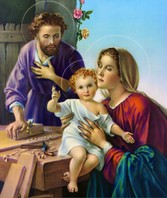 Christmas is on Friday. Wait, really?! Have we bought all of our presents? Are we ready for a Christmas feast? Is work ever going to end? These are the thoughts that plague us right now, but what we really should be asking is: are we ready for the birth of Christ? Advent is almost over - was there really enough time to prepare for the birth of the Son of God? The short is answer is 'no,' and the long answer is still 'no.’ But we know that as we prepare each liturgical year we take another step on the long journey toward Christ. Each celebration gives us the chance to refocus on that journey and draws us back into living out our faith wholly and fully. Who better to help us refocus our sight on Christ than the Holy Family? The Holy Family is the PERFECT example for us as we share in similar struggles. Through the Incarnation, Jesus became man and we believe him to be both fully human and fully divine. In a beautiful way his humanity is formed by Mary and Joseph. Who better to relate to then Mary and Joseph themselves? They were there when they thought Jesus was lost in the temple and there throughout his adolescence. Mary was there to inspire him to begin his ministry at Cana and was there as her son gave up his life for us. During Advent and Christmas we are watching Mary, Joseph, and Jesus grow and become a family. We should take this opportunity to allow ourselves to walk in their footsteps and live a life wholly committed to Christ. We should take this opportunity to ask for their intercession and assistance on our journey to God. Please do not think that their example only applies to families! Their example applies to each and every Catholic, Christian, non-Christian, and human being. The virtues that they live in the Bible are virtues that we should all be living. Look to how Mary and Joseph interact and form Jesus and open yourself up to them. No matter where we are in life we can learn from their unwavering commitment and their steadfast love. I challenge you to think about someone in your life who embodies these qualities: “unwavering commitment” and “steadfast love.” I only have to think back to last week at my father-in-law’s funeral. My wife was delivering the eulogy and said, “[he] reminded me of the importance of the ‘virtue of selfishness,’ as he so called it. This means that you can take control of how you feel, and you must take care of yourself so that you can take care of others. If you have nothing to give, what then are you authentically giving?” He got it. He understood that God is calling us to form ourselves in our faith, to root ourselves in him because we cannot lead others to God without first opening ourselves to his grace. How do we do this? We commit ourselves to Christ with steadfast love. This Advent, as we are preparing for the birth of Christ, let us remember to ground ourselves in his love so that as the new year comes we can go out and evangelize the world. Let us also remember Saint Pope John Paul II’s words on the Holy Family: “I wish to invoke the protection of the Holy Family of Nazareth…it is therefore the prototype and example for all Christian families…St. Joseph was a “just man”…may he always guard, protect and enlighten families. May the Virgin Mary, who is the Mother of the Church, also be the Mother of “the Church of the home”…May Christ the Lord, the Universal King, the King of Families, be present in every Christian home as He was at Cana, bestowing light, joy, serenity, and strength”. Nicholas Shields is a young professional working in Washington, DC.
Mary has appeared throughout the last two thousand years to different peoples all around the world. Tomorrow is the Feast of Our Lady of Guadalupe on which we celebrate the Virgin Mary’s appearance to Juan Diego on the Hill of Tepeyac outside of Mexico City. We have all heard the story of how Mary appeared to Juan Diego and told him to build a church on the hill in her honor. Upon returning to his town and informing the Archbishop of what he had seen, the Archbishop instructed him to return to Tepeyac and ask for a sign that this was indeed the Virgin Mary. Mary instructed Juan Diego to fill his tilma with roses and carry them back to the Archbishop. When Juan Diego laid the roses before the Archbishop there on his tilma was an image of the Virgin Mary, the image that we know today as Our Lady of Guadalupe. The Basilica built on the very spot of her appearance is the most visited Catholic site in the world. This alone speaks to the widespread devotion to Our Lady of Guadalupe throughout the world. Today’s feast day provides us with a wonderful opportunity to remember the universality of Mary. She has appeared to many different cultures at many different times throughout history and with each depiction she reminds us that she stands beside each and every one of us as a mother for all people.
Pope Francis, in an audience shortly before the Feast of our Lady of Guadalupe in 2013, spoke of one of the most important aspects of Mary: “When the image of the Virgin appeared on the tilma of Juan Diego, it was the prophecy of an embrace: Mary’s embrace of all the peoples of the vast expanses of America – the peoples who already lived there, and those who were yet to come. Mary’s embrace showed what America – North and South – is called to be: a land where different peoples come together; a land prepared to accept human life at every stage, from the mother’s womb to old age; a land which welcomes immigrants, and the poor and the marginalized, in every age. A land of generosity.” This points right to the heart of Mary as our Mother, a Mother for all peoples, for all cultures. The Virgin Mary is an important aspect of my own faith, but for one reason or another, her depiction as Our Lady of Guadalupe holds a special place in my heart. It might be because her feast day is also my birthday, or because my Dad often jokes that he wanted to name me Guadalupe, or that I grew up in Texas where this depiction is very prominent. I do not know why her image speaks to me so deeply, but I do know that in my devotion to Our Lady of Guadalupe I feel a Mother’s embrace. I know that she welcomes me in and I feel at home. But we are not meant to just live for that embrace of Mary, our Mother, but rather we are called to embrace all peoples and all cultures. And Mary teaches us how! She is the perfect example of how to live out that embrace. She unites us in our humanity and she strengthens our faith in Jesus. She knelt before the cross watching her own son die, and yet when Christ entrusted all of humanity to her, she said yes. She opened her arms and welcomed us in. On this Feast of Our Lady of Guadalupe, let us be like her, let us open ourselves to the whole Church, not just in our local communities but throughout the world. Nicholas Shields is a young professional in Washington, D.C. |
Details
Archives
July 2024
Categories
All
|
About |
Media |
© COPYRIGHT 2024 | ALL RIGHTS RESERVED

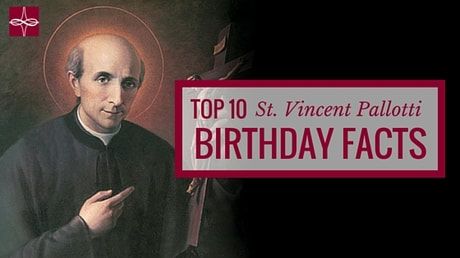
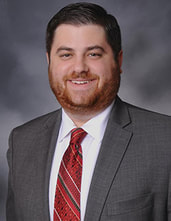
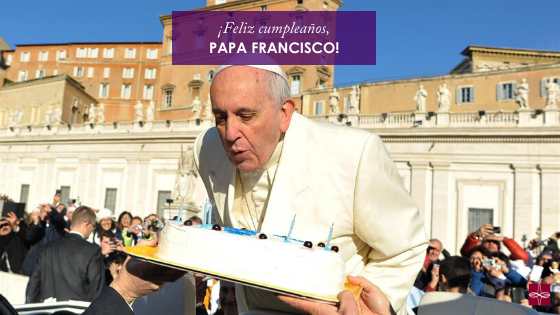

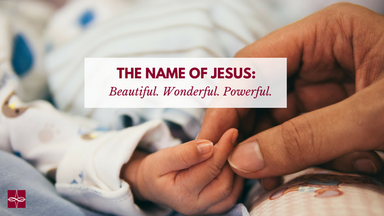

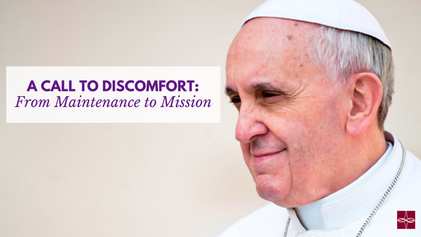

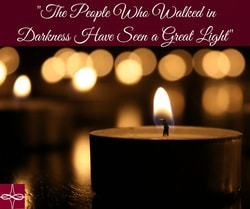

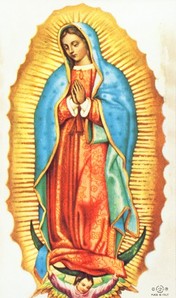
 RSS Feed
RSS Feed